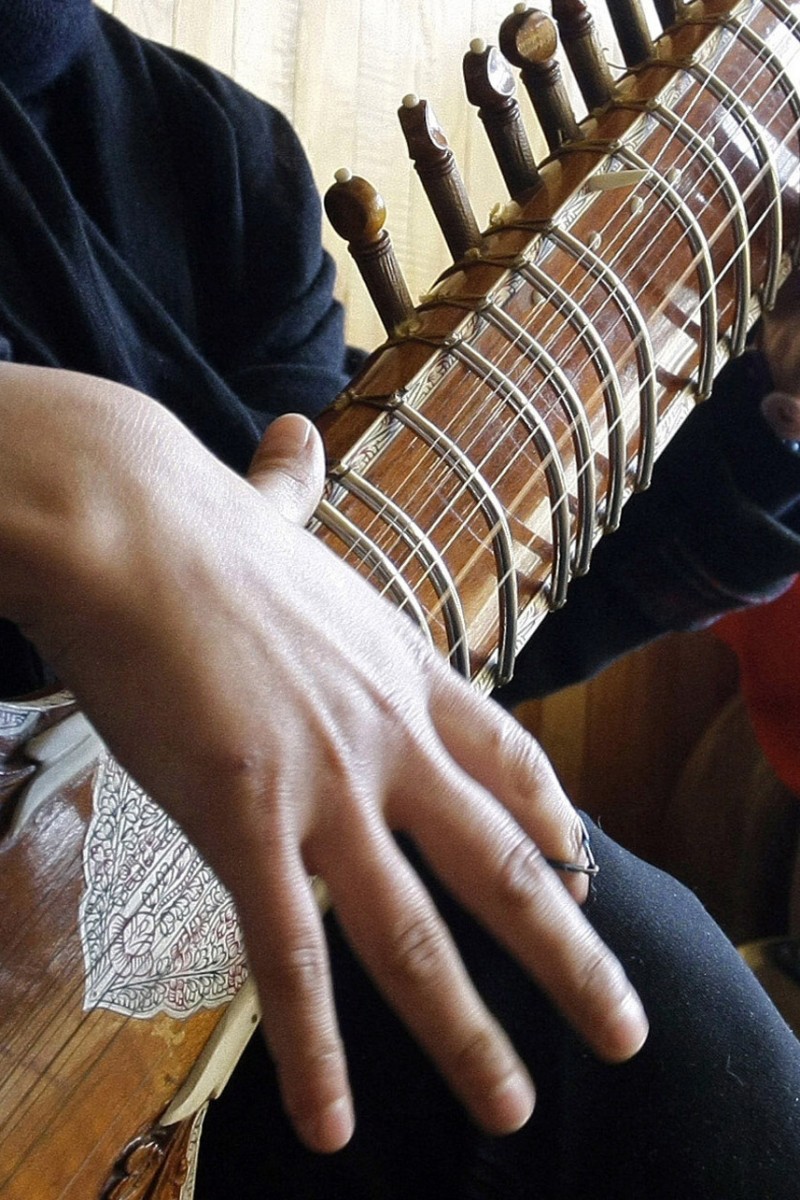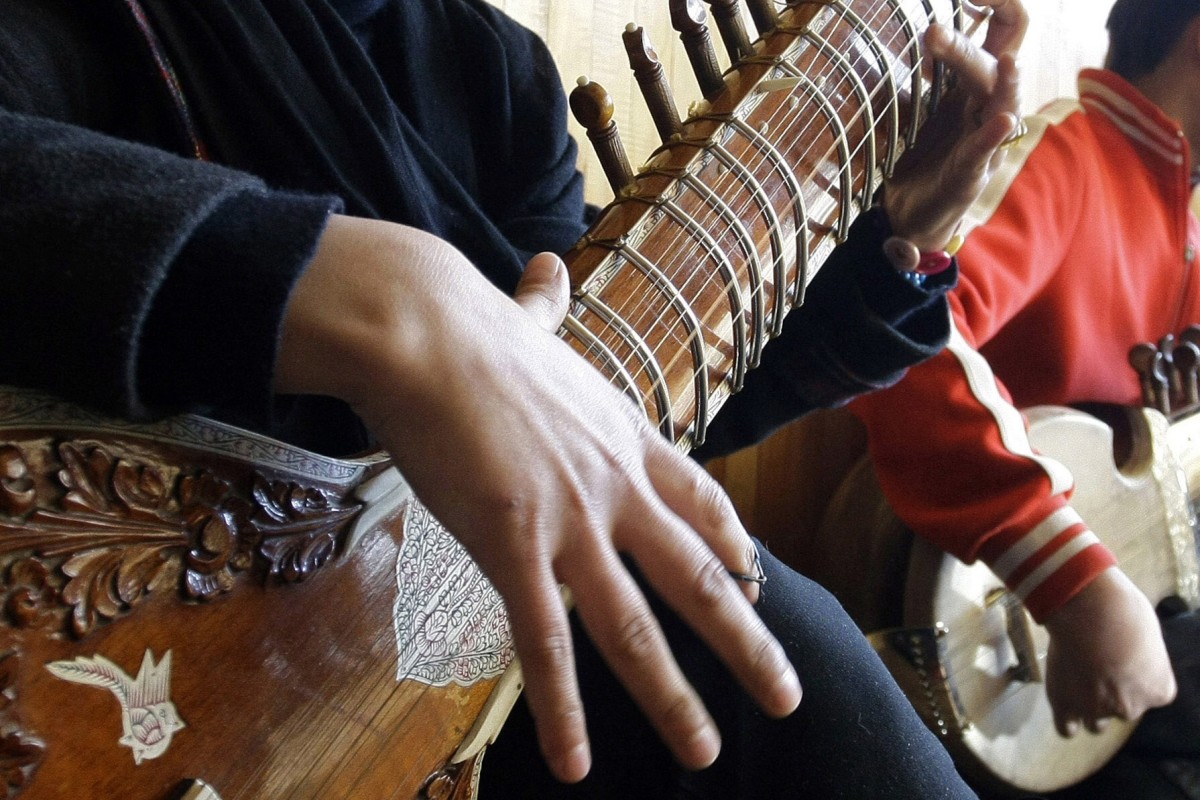
As the Taliban takes over Afghanistan, one music school fears for its future - and its students
- Ahmad Sarmast fled the country for Australia in the 1990s, but returned after the Taliban were ousted to teach children to learn to play music
- The religious extremists previously banned music under their rule, and some fear they may do so again
 A girl practices playing the sitar in a class at the Afghan National Institute of Music in Kabul, Afghanistan. Photo: AP
A girl practices playing the sitar in a class at the Afghan National Institute of Music in Kabul, Afghanistan. Photo: APA few years after the Taliban were ousted in 2001, and with Afghanistan still in ruins, Ahmad Sarmast left his home in Melbourne, Australia, on a mission: to revive music in the country of his birth.
The school he founded was a unique experiment in inclusiveness for the war-ravaged nation - with orphans and street kids in the student body, it sought to bring a measure of joy back to Kabul. The Taliban had notoriously banned music.
Last week, he watched in horror from his home in Melbourne images of the Taliban taking over the Afghan capital, capping a lightning offensive that restored the religious militia to power and stunned the world.
7 die in Kabul airport evacuation
Sarmat’s two mobile phones haven’t stopped ringing since. Many of the calls are from panicked students asking him what happens next. Will the school be closed? Would the Taliban outlaw music again? Are their treasured instruments safe?
“I’m heartbroken,” Sarmast said. “It was so unexpected and so unpredictable that it was like an explosion, and everyone was caught by surprise,” he said of the Taliban takeover.
Sarmast had left Kabul on July 12 for his summer holiday, never imagining that just few weeks later the whole project and everything he’d worked for the past 20 years would be endangered. He’s terrified for his 350 students and 90 faculty, many of whom have already gone into hiding. Reports of Taliban searching for adversaries door-to-door have fanned their worries.
Women in Afghanistan fear for their rights under the Taliban
“We are all very, very fearful about the future of music, we are very fearful about our girls, about our faculty,” he said. Sarmast, who spoke in a Zoom interview, requested that additional details about the students and school not be published, because he did not want to endanger them.
In a sign of what the future holds, radio and TV stations stopped broadcasting music, except for Islamic songs - though it was not clear if the change in programming was a result of Taliban edicts or an effort by the stations to avoid potential problems with the insurgents.
Sarmast, 58, the son of a famous Afghan composer and conductor, had sought asylum in Australia in the 90s, a time of civil war in Afghanistan.
Afghanistan’s ethnic diversity and its role in politics
In 1996, the Taliban swept into power. The ultra-religious movement banned music as sinful, with the sole exception being some religious vocal pieces. Cassette tapes were ripped apart and strung from trees.
But after the US-led invasion toppled the Islamists, Sarmast dreamed of renewal. After obtaining a doctorate in musicology, he returned to Afghanistan and in 2010 founded the Afghanistan National Institute of Music.
Donations from foreign governments and private sponsors soon poured in. The World Bank gave a cash grant of 2 million US dollars. Almost 5 tonnes of musical equipment - violins, pianos, guitars and oboes - were trucked in, a gift from the German government and the German Society of Music Merchants. Students learned to play traditional Afghan string instruments like the rubah, sitar and sarod. The tabla drum was among the favorites.
“It was such an amazing school, everything was perfect,” said Elham Fanous, 24, who was the first student to graduate from the music institute in 2014, after spending seven years at the school.
“It changed my life and I really owe it to them,” he said of the school, which he describes as Afghanistan’s LaGuardia, a public high school in New York specialised in teaching music and arts. A visitor once called it “Afghanistan’s happy place.”
“I cannot believe this is happening,” Fanous added, speaking from New York, where he recently received his master’s degree in piano from the Manhattan School of Music. He was also the first student from Afghanistan to be admitted to a US university music program.
The NGO empowering Hong Kong’s refugee population
The institute’s musicians traveled all over the world to represent their country, presenting a different face for a place known in the West only for war and extremism. Fanous himself performed at concerts in Poland, Italy and Germany.
In 2013, the institute’s youth orchestra embarked on its first US tour, appearing at the Kennedy Centre and selling out Carnegie Hall. Members of the orchestra included a girl who not long before had sold chewing gum on the streets of Kabul. An all-female orchestra called Zohra, named after a goddess of music in Persian literature, was set up in 2015.
In 2014, Sarmast was attending a concert in the auditorium of a French-run high school in Kabul when a huge bomb went off. He partially lost hearing in one ear and has had numerous operations to remove shrapnel from the back of his head since. The Taliban claimed responsibility for the suicide attack, accusing him in a statement of corrupting Afghanistan’s youth.
That only increased his determination, and he continued to split his time between running the school in Kabul, and Australia, where his family lives.
11 people die of hunger every minute
Today, he aches when he thinks of the melodies once echoing down the school corridors and the lives of boys and girls now being upended.
“We’re all shattered, because my kids, they’ve been dreaming. They had huge dreams to be on the biggest stage of the world,” Sarmast said. “All my students had been dreaming of a peaceful Afghanistan. But that peaceful Afghanistan is fading away.”
A guide to what’s happening in Yemen
Still, he hangs on to hope, believing young Afghans will resist. He is also counting on the international artistic community to put up a fight for the Afghans’ right to music.
“I’m still hopeful that my kids will be allowed to go back to the school and continue and to enjoy from learning and playing music,” he said.